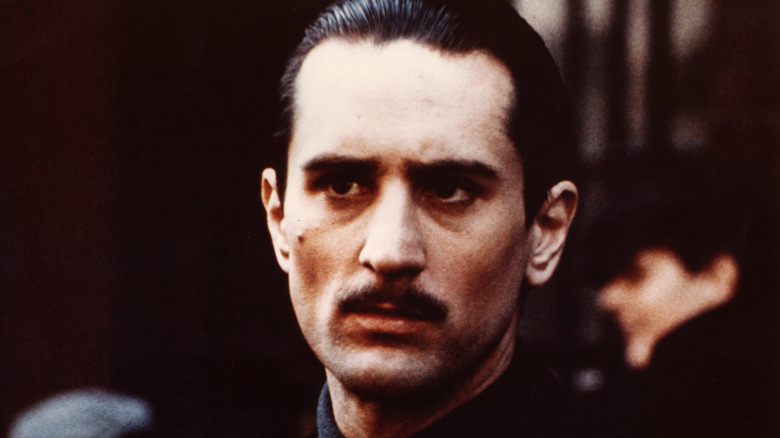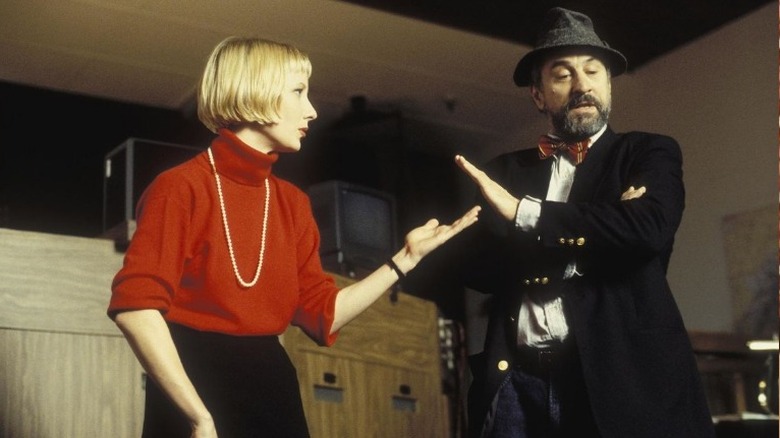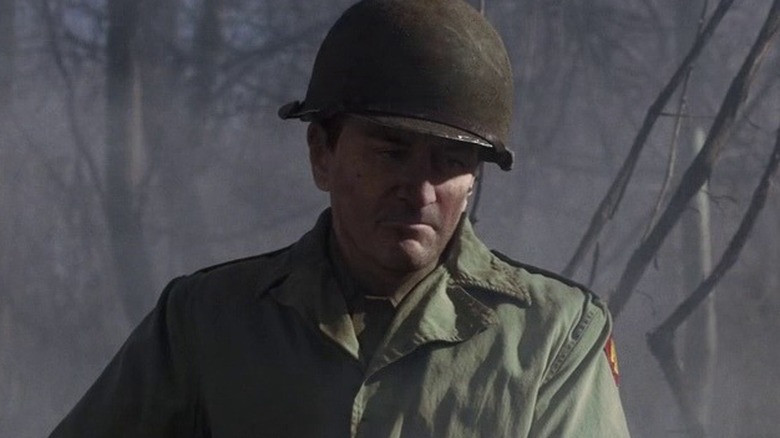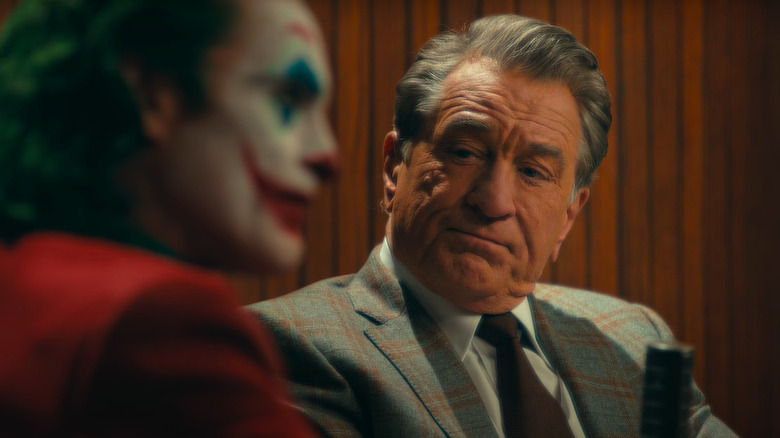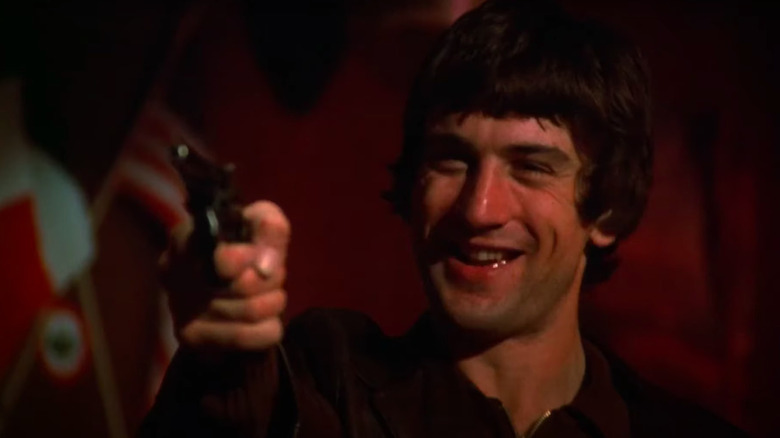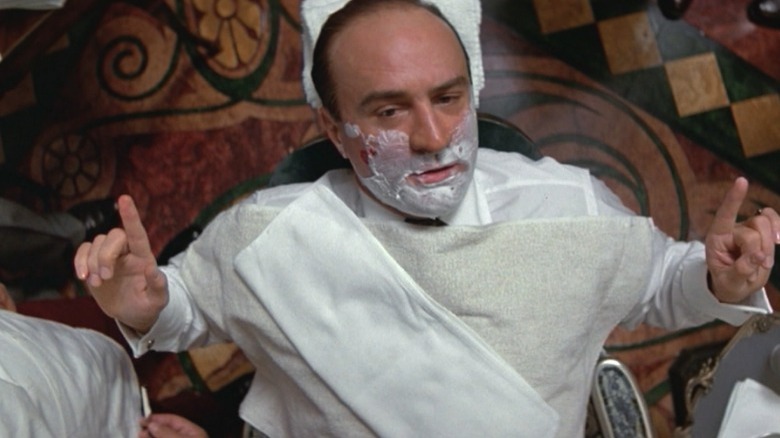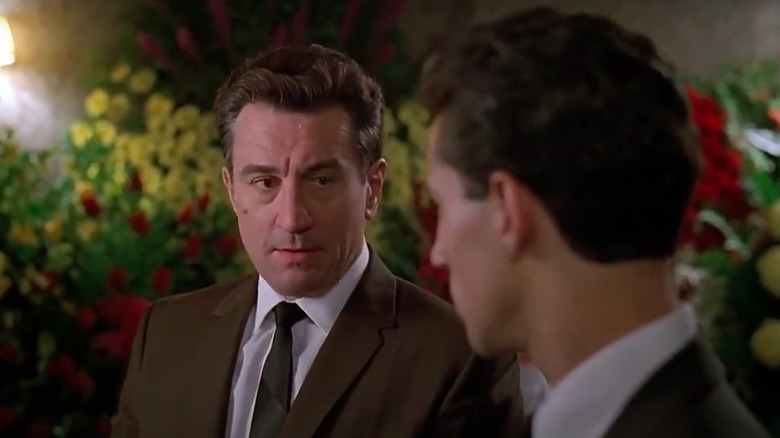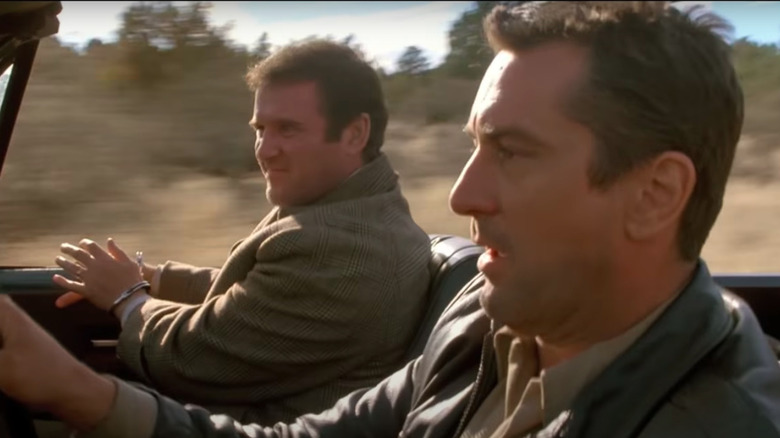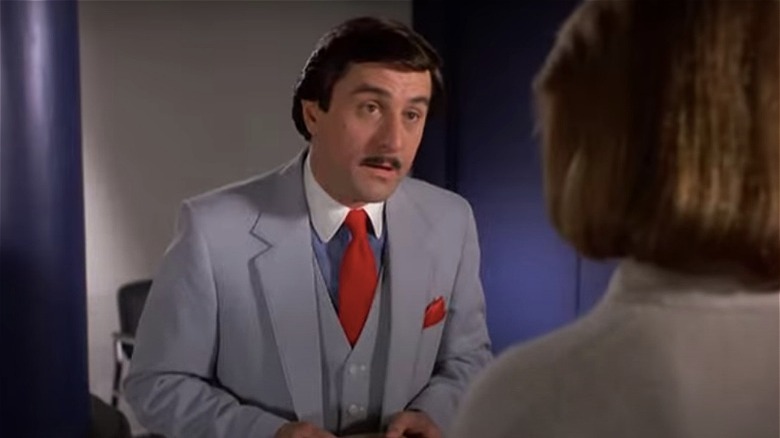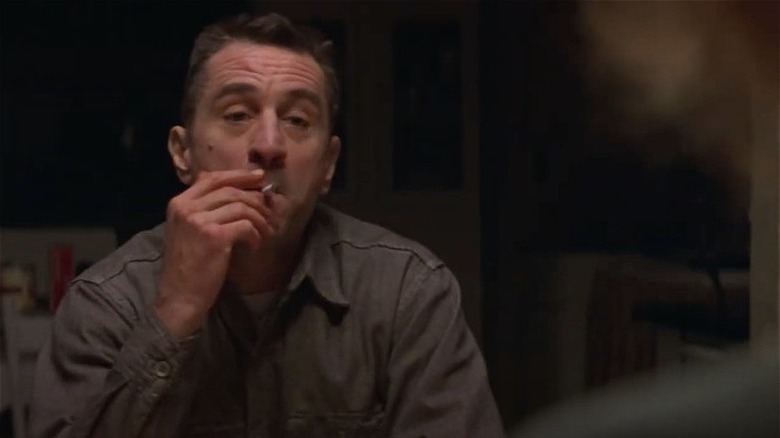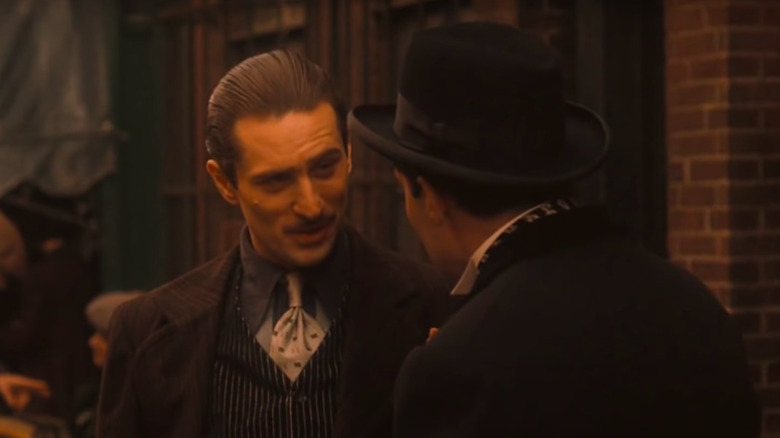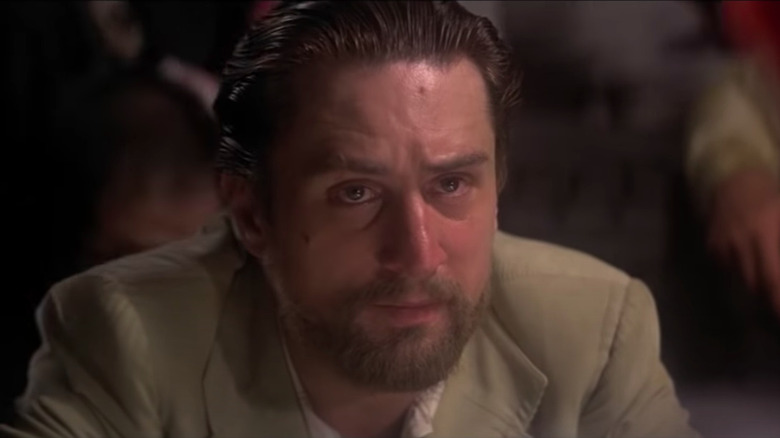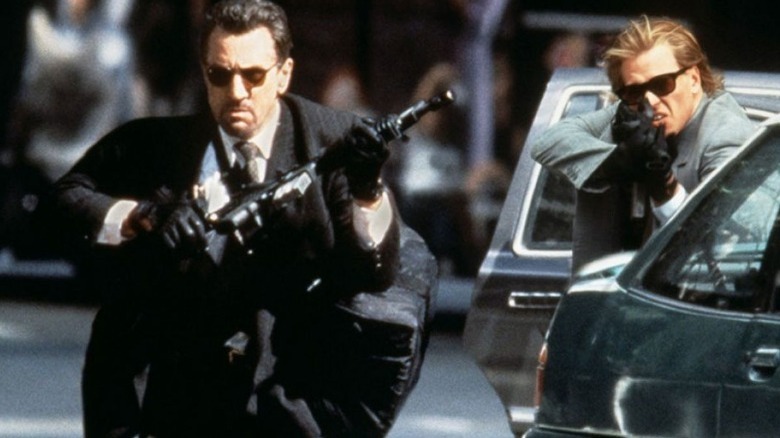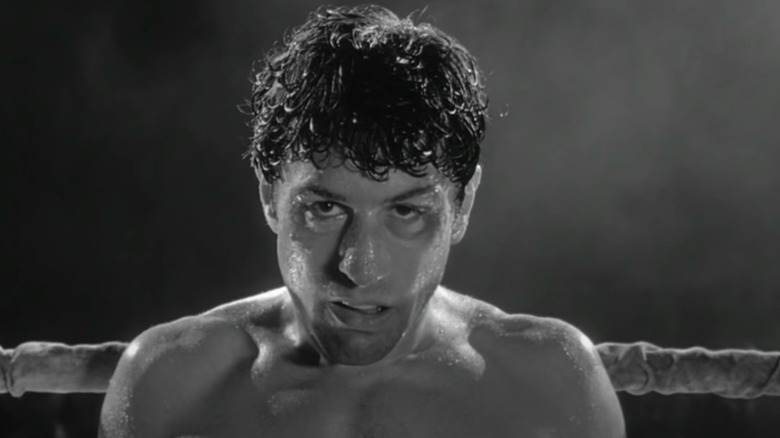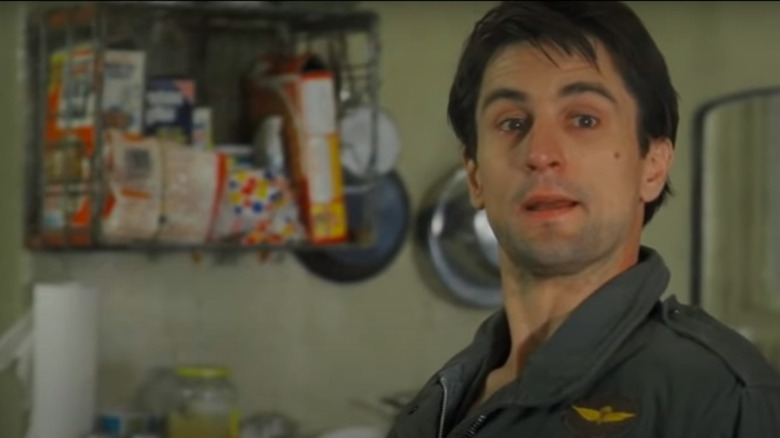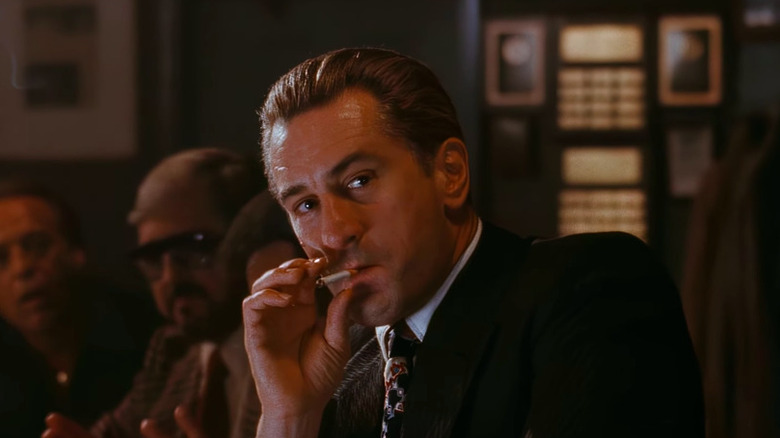The 15 Best Robert De Niro Films, Ranked
Back at the turn of the 21st century, "The Adventures of Rocky and Bullwinkle" was the nadir of Robert De Niro's career. Surely the great actor couldn't fall any further? Well, teeth continued to grit as De Niro got caught in the proverbial middle of the road, appearing in the likes of "The Score," "Meet the Fockers," and "Hide and Seek."
Later, in the early 2010s, we were treated to "Freelancers," "Red Lights" and "The Bag Man." Heard of them? Me neither. I had to trawl through De Niro's IMDb page for those. However, what I do remember is "Dirty Grandpa," which was followed four years later by "The War with Grandpa" (not canon with each other, I believe). How did this happen? To any child who hasn't heard of the 1970s, Robert De Niro must seem like a joke.
Fortunately, there have been glimmers of hope. De Niro got an Oscar nod for "Silver Linings Playbook," which was better, but still not great. Then, there was the one-two punch of "Joker" and "The Irishman," both released in 2019. That was probably the best De Niro double bill since 1995's "Heat" and "Casino." Still, De Niro's 21st century resume is dumbfounding.
But it hasn't always been this way. Robert De Niro was a leading actor of the New Hollywood period, which saw him appear in more classic films than just about anyone, and he can still turn in a stellar performance when the material is strong enough. To prove it — and to simply remind you of better times — here are his 15 best films.
15. Wag the Dog
"War is showbusiness," says Stanley Motss (Dustin Hoffman), a bronzed Hollywood producer who lives in an ether of wealth and opulence. Motss is speaking to Conrad Brean (De Niro), a White House spin doctor tasked with distracting the public from a presidential sex scandal. Skilled in disinformation though he may be, Brean's latest assignment needs big production values, which is where Motss comes in. Studios, green screens, CGI — Motss has it all, and he's using it to create a fake American war in Albania.
As a character, Brean doesn't give De Niro much to play with. He's very much a background operator; it's Stanely Motts, whom Hoffman plays with preening bombast, who's the real star. Brean shifts gears when he has to, though, and De Niro shines during a CIA interrogation scene where Brean disarms his target with total, unadulterated spin.
The real point of "Wag the Dog" is that the masses can be manipulated by evocative imagery and sentimental narratives. I don't disagree, but faking a whole war? That's not plausible. Waging a real war on false pretenses, sure. But creating a fictitious war with just a green screen and some media commentary? I don't think so.
However, that doesn't mean the film isn't prescient. Quite the contrary, in fact. In 1998, just months after the film was released, the Monica Lewinsky scandal broke, followed by missile strikes on Sudan and Afghanistan (via CNN). A distraction? Perhaps!
14. The Irishman
If you discount "Heat," the Michael Mann epic in which Pacino and De Niro shared the screen for a single scene, "The Irishman" is the first joint project truly worthy of both actors. The vast 3-hour, 29-minute narrative charts the life of Frank Sheeran (De Niro), an Irish American union official with links to the mob and a close relationship with Jimmy Hoffa (Al Pacino), the infamous Teamsters leader who went missing in 1975.
Theories abound about Hoffa's fate, but "The Irishman" offers a very clear vision of what happened (whether or not it's accurate, however, is a subject of some debate). As for the rest of the movie, well, it's far from bad, but it's not quite the sum of its parts. It's similar to "Casino" in that respect, which almost appeared here in its place. "The Irishman" is more interesting for the time being, though, namely because of Al Pacino's presence. In addition, "The Irishman" successfully distinguishes itself from "Goodfellas," a feat that "Casino" can't quite pull off — the latter film feels like a rehash, especially Joe Pesci's fierce but familiar turn as Nicky Santoro.
However, "The Irishman" has its own problems with characterization. A film of this size needs to be anchored by a complex character, which Frank Sheeran is not. If I had to compare Sheeran's emotional range to something, it would be a block of granite. It doesn't matter whether he's relaxing with his family or shooting up a restaurant — the man simply does not express himself. All he does is kill people, and he does so with the same empty sense of duty that he brings to his career as a truck driver.
13. Joker
A rather tame entry in the annals of controversial cinema, "Joker" was criticized for its similarities to the films of Martin Scorsese and other '70s auteurs. As if that's a bad thing! Sure, the likenesses are unmistakable. If you're feeling harsh, you may even call "Joker" derivative. At least it's the most compelling derivation in recent memory. Director Todd Phillips took the themes and aesthetics of "Taxi Driver," "The King of Comedy," and "Death Wish" and applied them to the DC Universe, giving the comic book genre not only a visceral edge but some cinematic heritage, too.
Robert De Niro personifies this lineage. As Murray Franklin, a smug Gotham City talk show host, De Niro inverts the character of Rupert Pupkin, his delusional wannabe comic from "The King of Comedy." He is now the Jerry Langford character from that film, who was the idol of Pupkin's fantasies. The difference is that Langford is generally patient and courteous, while Franklin is self-righteous and mean spirited, mocking Arthur Fleck's aspirations in front of an audience of voyeurs. "Joker" was the first R-rated film to make over $1 billion, so you can probably guess how Murray Franklin pays for his sins.
12. Mean Streets
In 1973, Robert De Niro, Harvey Keitel, and Martin Scorsese all had feature film experience, but it was "Mean Streets" that truly kicked off their careers, especially Scorsese and De Niro, who began their remarkable partnership with this film. Like much of the cast and crew's later work, it's an urban story, but "Mean Streets" is an especially unvarnished example; this grit is more a result of Scorsese's vision than the constraints of the $300,000 budget.
It was Scorsese's ambition to create a film to contrast with "The Godfather," one that provided a more realistic depiction of Italian Americans. Cinematographer Kent Wakeford was vital in realizing Scorsese's ambition. "My vision ran with Martin's," Wakeford said (via In Depth Cine). "Martin wanted to capture anxiety and conflict in each character. It was key." Wakeford created this paranoid tension with an Arriflex 35BL, which was the first silent handheld 35mm camera. This technology allowed the filmmakers to create extensive tracking shots that followed the characters down the streets of their neighborhood and into the hallways of their homes.
Critics were almost unanimously positive about the film, particularly when it came to De Niro's performance. In a retrospective review, the Sydney Morning Herald called the film "freewheeling, energetic and raw," adding that "when DeNiro is not on screen, the film seems loose and rambling. When he's there, 'Mean Streets' is magnetic."
11. The Untouchables
"I want him dead! I want his family dead! I want his house burned to the ground!" That's perhaps the most quotable line of De Niro's brutish turn as Al Capone, the Brooklyn-born gangster who ruled Chicago's underworld in the late '20s and early '30s, in "The Untouchables." Brian De Palma's gangland epic tells the story of the kingpin's downfall, which is spearheaded by Elliot Ness (Kevin Costner), a prohibition agent who crusades against both organized crime and the corruption within Chicago law enforcement agencies.
As The Guardian explains, "The Untouchables" is bad history but good entertainment, and it ranks among director De Palma's best work. It's not such an important film for De Niro. While his performance is solid, Capone is a supporting role, and has a tertiary presence on De Niro's lengthy filmography. Still, it is a more than dependable performance that helps to make De Palma's film one of the better gangster flicks of the period.
But could it have been elevated further? Before De Niro was cast, British actor Bob Hoskins was in contention for the part. As Hoskins explained to Conan O'Brien, De Palma invited him to discuss the role, with the caveat that Robert De Niro was his preferred choice. Hoskins was happy to play Capone, but De Niro, who had been hard to pin down, ultimately expressed interest, sealing the deal. Sometime later, Hoskins received a check for $200,000 with the note, "Thanks for your time. Love, Brian." Hoskins called De Palma immediately: "Brian, listen, you got any films you don't want me to be in, I'm there for you."
10. A Bronx Tale
"A Bronx Tale" was De Niro's first outing in the director's chair, and it earned him lots of praise from critics. Newsweek called his debut "vital," while Roger Ebert wrote that De Niro "finds the right notes as he moves from laughter to anger to tears." With reviews like that, you may wonder why it took De Niro 12 years to direct his second feature, 2006's "The Good Shepherd." Maybe it was the meager box office returns? Whatever the reason, it's a pity that De Niro has directed only two pictures, because he is a safe pair of hands.
Adapted from a one-man stage show by Chazz Pilminteri, "A Bronx Tale" is about a battle of wills between a mobster named Sonny (Chazz Palminteri) and Lorenzo (De Niro), a bus driver. The men are playing tug of war over the soul of Lorenzo's son, Calogero, in whom the Bronx bus driver attempts to instill a blue-collar work ethic. Calogero, however, is tempted by Sonny's charm and authority, which he wields over the Belmont area of the Bronx.
This sounds like the set up for a bloody confrontation, but that isn't what "A Bronx Tale" is about. Sonny might be a killer and a crook, but he's benevolent, too. Is Lorenzo right to worry about Calogero? Yes, but Sonny isn't trying to exploit the kid like Lorenzo believes. The mobster is drawn to Calogero's youth and innocence, which perhaps remind him of his life before crime.
9. Midnight Run
Riding the buddy comedy wave of the 1980s, "Midnight Run" is the highlight of Robert De Niro's dubious foray into comedy. Here, De Niro plays Jack Walsh, a bounty hunter tasked with transporting con artist Jonathan Mardukas (Charles Grodin) from New York to Los Angeles.
As with "Rain Man," the other big road comedy from 1988, screenwriter George Gallo had to figure out why the characters couldn't just fly. The solution is easy: As Walsh and Mardukas settle into their first-class seats, the con artist feigns a panic attack, forcing the pair to book an Amtrak from Grand Central Station. As they embark on their cross-country voyage, Walsh and Mardukas must contend not just with each other but also the mob, the FBI, and a rival bounty hunter, all of whom are out for Mardukas' head.
The film is driven by the leads' chemistry. Walsh is an earthy tough guy, while Mardukas is a smart-ass, leading to numerous tit-for-tat exchanges as they get nearer and nearer to wringing each other's necks. Their playful enmity is punctuated by some solid action sequences, too.
8. The King of Comedy
"The King of Comedy" is my go-to alternate reply to the question, "What's your favorite Scorsese film?" My real answer will always be more mainstream, of course — more on that later — but the "The King of Comedy" is still one of the jewels of both De Niro and Scorsese's filmographies.
De Niro stars as Rupert Pupkin, who could well be a relative of Travis Bickle. Pupkin isn't as violent as Bickle, but he's similarly alienated from society, living in his own head and consumed by grandiose thoughts of fame and success. His idol is Jerry Langford, a barely fictionalized version of Jerry Lewis, who brings his own experiences with fame to the role. Pupkin ingratiates himself with Langford until the star finally snaps, rejecting Pupkin forcefully enough that even the would-be stand-up realizes that he needs to enact his desperate, illegal contingency plan.
Occupying similar thematic territory as "Network" but without the shouty moralizing, "The King of Comedy" satirizes our culture's obsession with celebrity and the voyeuristic pleasure we take in misfit spectacles, which has only become worse since the early '80s.
7. This Boy's Life
Retrospectives of Leonardo DiCaprio's early career often focus on "What's Eating Gilbert Grape" and not "This Boy's Life." That's a mistake. Both are stirring family dramas, but "This Boy's Life" has greater pathos because of the odious villain of the piece, Robert De Niro's Dwight Hansen.
Set in the 1950s, "This Boy's Life" is adapted from Tobias Wolff's memoir of the same name. The film opens with Caroline (Ellen Barkin), Wolff's single mother, looking for a man who can provide her son with a stable family life. Dwight is the latest candidate, making a square impression with "jokes" like, "People can call me anything, as long as they don't call me late for supper!"
Caroline knows that Dwight is a dork, but after years of fickle nomadism she's searching for reliability above all else. That's a sad, vulnerable state. Being reliable is important, but it cannot sustain a relationship on its own. Even worse, Dwight isn't actually reliable at all — rather, he's an insecure and abusive tyrant.
This becomes clear when Caroline and Toby move with Dwight to Concrete, Washington. Despite the name, it's a beautiful town, but the verdant sense of place is overwhelmed by the tension between Dwight and Toby, which is very hard to watch. This is nasty stuff. De Niro's performance harkens back to his brooding work in "Raging Bull," but his turn as Dwight is even more hateful.
6. The Godfather Part II
It's hard to believe that "The Godfather Part II" was greeted with a lukewarm response when it premiered in 1974. Vincent Canby of the New York Times wrote that it was "not a sequel in any engaging way," adding that it was "made largely out of the bits and pieces of Mr. Puzo's novel that didn't fit into the first." Roger Ebert was also critical of the narrative structure, arguing that Michael Corleone's story would have been more engaging without the flashbacks to his father's youth in Italy and New York City.
I think the inverse is true. Vito Corleone's backstory is more interesting than Michael's stone-faced machinations in the 1950s. Coppola and cinematographer Gordon Willis use an almost sepia filter for those scenes, casting a brassy glow on the image that compliments the vast location work and immerses you in an exquisite sense of mood and place. All of this comes to head when Vito stalks Don Fanucci from the rooftops, which is a sequence of pure cinema.
The lynchpin here is Robert De Niro, who, as Vito, takes the baton from Marlon Brando with brilliant subtlety. Emulating Brando's softly-spoken authority, De Niro manages to capture Vito's gift for gentlemanly manipulation and how he uses it to rise from a tenement dweller to New York City mob boss. De Niro's sequences are so thick with atmosphere and authenticity that one wonders if a dedicated prequel would have been superior to the multi-generational epic that premiered in the winter of 1974.
5. The Deer Hunter
One of the earlier Vietnam war films, "The Deer Hunter" has the power to stun an audience into silence. It follows a group of steel workers from Pennsylvania, and tells their story in three acts: before the war, during the war, and after the war.
Unlike "Apocalypse Now" and "Full Metal Jacket," Michael Cimino's epic concerns the home front more than the front line, and it does so with an almost novelesque pace. But it is during the story's brief, brutal journey to Vietnam that "The Deer Hunter" makes its most searing impression. I am referring, of course, to the infamous Russian roulette scene, in which Steven (John Savage), Michael (De Niro) and Nick (Christopher Walken) are forced to play the deadly game by the Viet Cong.
The scene is suffering at a fever pitch, and De Niro meets it with some of the angriest moments of his career, cursing his sadistic captors as he plots an escape. This righteous anger manifests on the home front, too, namely when he finds Stanley (John Cazale) using a gun irresponsibly. These moments provide a contrast to Michael's default emotional state, which is that of a grounded blue-collar guy.
De Niro's work as Michael may seem effortless, but lots of research went into the role. According to GQ, De Niro visited Ohio steel towns such as Mingo Junction and Steubenville, befriending locals and staying in their homes. He also volunteered to work in steel mills, but was allowed only to observe.
4. Heat
"Heat" is one hell of a film. Oozing the ethereal, norish style of director Michael Mann, it is a sprawling epic with beautifully stark grading and a metafictional spark between Al Pacino and Robert De Niro, who shared the screen for the first time all too briefly. The three-hour narrative hosts a vast cast of characters and plenty of memorable dialogue, yet "Heat" is not quite a character-driven film, despite the performers' rakish charisma, especially Pacino's bombast and De Niro's steely professionalism.
Instead, "Heat" is a very talkative cops-and-robbers movie that's led by plotting and scheming, which are usually discussed at rapid-fire pace over Styrofoam coffee cups. You're unlikely to digest every development on a first watch, but you'll be absorbed into these people's high-crime, high-stakes world regardless. Because of that, "Heat" doesn't have the narrative cohesion of "Goodfellas," and it doesn't have its heart, either. But this film is a slick procedural, not a drama, and it is one of the most skilful and ambitious examples of the genre. Don't forget the tangible, electric shootout, either; the staging and acoustics are superb.
3. Raging Bull
I'm not sure what Jake LaMotta was thinking when he agreed to have his memoir adapted into a feature film, because "Raging Bull" is more about pathological jealousy than boxing. De Niro plays LaMotta as a domestic tyrant, shouting obscenities, flipping furniture, and slapping his wife Vicki (Kathy Moriarty) across the face. The real LaMotta was even worse. According to the Guardian, LaMotta confessed to abusing his wives, committing rape, and beating a man so brutally that he believed his victim was dead.
Clearly, LaMotta is not a sympathetic character. Yet "Raging Bull" is a brilliant and moving character study, featuring perhaps the finest acting of De Niro's career. Take the moment in which LaMotta, doughy and washed up, accuses his brother Joey (Joe Pesci) of having sex with his wife; LaMotta leers at him, fixed and stiff like a dog that's ready to pounce. It's a suffocating insight into a paranoid mind.
Speaking with Sky Movies, Quentin Tarantino remembered a conversation he had with Brian De Palma, Martin Scorsese's directoral colleague and "friendly" rival. De Palma reminisced about the first time he watched "Raging Bull," which opens with a majestic scene of LaMotta shadow boxing in the ring set to Mascagni's "Cavalleria Rusticana: Intermezzo." It's one of the most arresting sequences of Robert De Niro's career, and it caused De Palma to observe, "No matter what you do, no matter how good you are ... there's always Scorsese."
If you or anyone you know has been a victim of sexual assault, help is available. Visit the Rape, Abuse & Incest National Network website or contact RAINN's National Helpline at 1-800-656-HOPE (4673).
If you or someone you know is dealing with domestic abuse, you can call the National Domestic Violence Hotline at 1−800−799−7233. You can also find more information, resources, and support at their website.
2. Taxi Driver
"Taxi Driver" has been a favorite of cinéastes for some 45 years now, spawning numerous t-shirts, pieces of artwork, and other memorabilia. But Travis Bickle, one of Robert De Niro's most enduring characters, is not a cool guy. He's a tragic, lonely figure, jaded by alienation and a festering anger that he struggles to articulate. Bickle says that he will "go all over ... I take people to the Bronx, Brooklyn ... I don't care, don't make no difference to me," yet he also rails against "all the animals that come out at night," referring to a cross section of the population that he hates.
After being rejected by Betsy (Cybill Shepherd) and fixating on Iris (Jodie Foster), a child prostitute, Bickle prepares himself for violence, the direction of which is unclear. Will Bickle attack the glib establishment to spite Betsy, or will he indulge his savior complex in a vigilante war against the pimps and drug dealers who control Iris?
As it nears its 50th anniversary, "Taxi Driver" remains a brilliant character study and one of the best films of the New Hollywood period, embodying the era's themes of violent angst and cynical alienation. It's also a compelling example of neo-noir, with its mournful score, cynical perspective, and the moral decline of its complex quasi-antihero.
1. Goodfellas
Adapted from Nicolas Pileggi's nonfiction book "Wiseguys," "Goodfellas" charts the rise and fall of Henry Hill, a mobster who was part of the Lucchese family for two and a half decades. Played by the late Ray Liotta, Hill's story is told with a remarkable energy that buzzes with Martin Scorsese's signature blend of stunning imagery and popular music, including tracks from Tony Bennett and The Rolling Stones.
In it, De Niro plays Irish mobster Jimmy Conway, one of Hill's mentors. It's a supporting role, but there are some classic De Niro mannerisms on display here, i.e., the squinty eyes and the downward-open smile that makes it look as if he's about to sneeze. Take this scene, in which Conway urges Hill to rekindle his marriage. It's a low-key moment, but it typifies the De Niro mobster — reasonable, reassuring, and even fatherly, yet very deliberate when it comes to getting what he wants.
Conway is not De Niro's best performance, but that's because of the character's limitations, not his own. Travis Bickle and Jake LaMotta both have more meat on them. But are "Taxi Driver" or "Raging Bull" better than "Goodfellas"? Possibly. I could wax lyrical about all of them. But before I fire superlatives at "Goodfellas," I will express a comparison I am sure of: "Goodfellas" is better than "The Godfather." Coppola's film is obviously great, yet there is a dark, gloomy and portentous energy that works against it, which stands in stark contrast to the dynamic exuberance of "Goodfellas."
